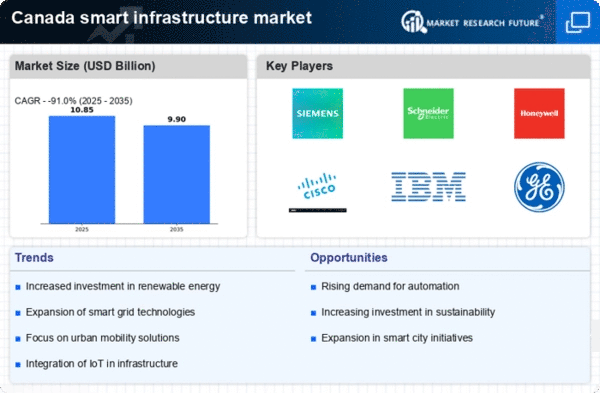Government Initiatives and Funding
The Canadian government actively promotes the smart infrastructure market through various initiatives and funding programs. Investments in smart city projects, such as the Smart Cities Challenge, aim to enhance urban living by integrating technology into infrastructure. In 2025, the government allocated approximately $300 million to support innovative projects that leverage data and technology to improve public services. This funding not only stimulates economic growth but also encourages local governments to adopt smart solutions. The emphasis on digital transformation in public infrastructure is likely to drive the smart infrastructure market, as municipalities seek to modernize their services and enhance citizen engagement.
Public Safety and Security Concerns
Public safety and security remain paramount concerns for Canadian cities, influencing the smart infrastructure market. The integration of smart technologies, such as surveillance systems and emergency response solutions, enhances urban safety. In 2025, municipalities are projected to invest approximately $200 million in smart safety technologies, reflecting a growing commitment to protecting citizens. The implementation of smart infrastructure solutions can improve emergency response times and facilitate better communication during crises. As public safety concerns continue to evolve, the demand for innovative solutions in the smart infrastructure market is likely to increase, driving further investment and development.
Technological Advancements in IoT and AI
The integration of Internet of Things (IoT) and Artificial Intelligence (AI) technologies is revolutionizing the smart infrastructure market in Canada. These advancements enable real-time data collection and analysis, facilitating better decision-making and resource management. For instance, smart sensors can monitor traffic patterns, while AI algorithms can optimize energy consumption in buildings. The market for IoT devices in Canada is projected to reach $10 billion by 2026, indicating a robust growth trajectory. As these technologies become more accessible and affordable, their adoption in infrastructure projects is likely to accelerate, further propelling the smart infrastructure market.
Rising Urbanization and Population Growth
Canada is experiencing significant urbanization, with over 80% of its population residing in urban areas as of 2025. This trend creates a pressing need for advanced infrastructure solutions to accommodate growing populations and their demands. The smart infrastructure market is poised to benefit from this urban expansion, as cities require efficient transportation systems, energy management, and waste disposal solutions. The increasing population density in urban centers necessitates the implementation of smart technologies to optimize resource allocation and improve quality of life. As urban areas continue to expand, the demand for smart infrastructure solutions is expected to rise, driving market growth.
Focus on Energy Efficiency and Sustainability
The increasing awareness of environmental issues has led to a heightened focus on energy efficiency and sustainability within the smart infrastructure market. Canadian cities are implementing smart grid technologies and renewable energy solutions to reduce carbon footprints and enhance energy management. In 2025, it is estimated that investments in energy-efficient infrastructure will account for over 25% of total infrastructure spending in Canada. This shift towards sustainable practices not only addresses climate change but also promotes economic resilience. As municipalities prioritize green initiatives, the smart infrastructure market is expected to expand, driven by the demand for sustainable solutions.
















